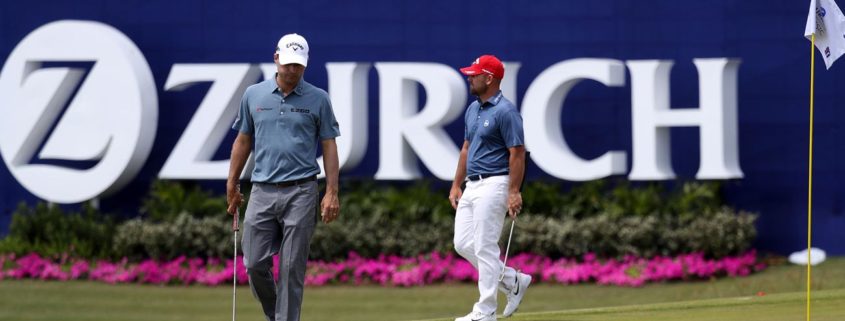The Zurich Classic of New Orleans concluded Sunday with Billy Horschel and Scott Piercy winning the tournament by one stroke over Jason Dufner and Pat Perez. Horschel and Piercy each won a little more than $1 million and earned a two-year PGA Tour exemption.
Next step in the creative brain of tournament director Steve Worthy: Getting the winners into the Masters.
“I’m not saying I think it will happen next year or the year after or perhaps ever,” Worthy said Sunday morning. “But when I brought it up, I didn’t get a flat no or anyone laughing at me. They said, ‘We’ll take a look at it.’ That’s all I can ask.”
A Masters invite for the winners of what is now the tour’s only team event would be a Grand Slam home run for Worthy and his tournament. Even without the Masters though, it is already a home run.
Sunday’s finish marked the second year the tournament has been played as a team event after 59 years as a 72-hole stroke-play event. That was the problem: New Orleans was always a solid tour stop, played on good golf courses. But with a late April date that came when most top players are looking for a post-Masters break, the quality of its field had suffered.
“In 2016, we had four of the top 30 in the World Rankings,” Worthy said. “This year we have six of the top 10, 10 of the top 15 and 18 of the top 30. Players like what we’re doing. We’re going to keep trying to give them something different every year. What it’ll be, I’m not sure. We’ll sit down and talk about it after we’re done this year.”
The first year of team play was a roaring success, players enjoying the idea of a unique format and the chance to partner up with a buddy. This year, Worthy added walk-up music as the players approached the first tee. Who knows what next year might bring.
RELATED: What entrance music says about the players at the Zurich Classic
Regardless, the success in New Orleans has made other tournament directors start to think outside the box. “I’ve heard guys talked about maybe having a mixed team event,” Worthy said—a notion PGA Tour commissioner Jay Monahan said was, ‘only a matter of time,’ on Sunday.
There’s also been talk about another tour event perhaps going to match play. The WGC-Dell Match Play has been a success since launching in 1999. Perhaps some tournament struggling to get players might make the switch if only to break the monotony of one identical 72-hole stroke-play event after another.
The genesis of the idea came on April 19, 2016 at 6:12 a.m. when Andy Pazder, the tour’s executive vice president and director of operations, had, as he called it, “a crazy idea,” while he was drinking his morning coffee.
Pazder texted Jay Monahan, the tour’s commissioner-in-waiting (that’s how he knows the exact time) and wondered about making New Orleans a team event. Monahan suggested running the idea by CAA—the agency that represents Zurich. If the title sponsor didn’t like it, there was no sense going any farther with it.
CAA and Zurich were intrigued. From there, the idea was passed onto Worthy, who would have to execute it going forward—36 holes of best-ball; 36 holes of alternate shot. He also liked it because he knew something had to change or New Orleans might go the way of other PGA Tour events that didn’t have a title sponsor when the Zurich contract was up in 2019.
“When we all got together after the tournament in 2016 we talked the idea around and, at some point it became apparent there was a consensus in the room that this was worth a try,” Worthy said. “We knew it was different. But that’s what we needed.”
To some, the notion was far-fetched. New Orleans was one of the tour’s oldest events. It was actually first played in 1938, went dormant for 10 years in 1948 and has been part of the tour every year now since 1958.

“All the reports we were getting back on our execution during the week were excellent,” Worthy said. “The players were all very positive about what we were doing for them. But the fact was we weren’t getting the kind of fields we wanted—or needed. Being realistic, that was an issue.”
Worthy had just finished his fifth year as tournament director in New Orleans. He had spent five years as the operations director at the Memorial and then 15 with the USGA, running the U.S. Open. In 2007, he’d been offered the chance to be a tournament director at Pebble Beach.
“I loved it there,” he said. “I mean, come on, it’s Pebble Beach. The people out there were great to me.”
Which begs the question, why would anyone leave Pebble Beach, one of the tour’s most iconic stops, to take over the struggling event in New Orleans? The answer’s simple. “It was home,” Worthy said. “More than a few people questioned my sanity when I took the job but I was turning 50 and, well, home’s home.”
Worthy grew up outside Baton Rouge, was a decent high school quarterback and went to LSU (not to play football). “My last high school game I threw five interceptions,” he said. “Three were returned for touchdowns. My offensive line didn’t tackle very well.”
The good news when Worthy arrived was that the tournament had a solid sponsor—Zurich, which had come on board in 2005 and was locked in through the 2019 tournament. But as the years on the contract dwindled and the fields didn’t get much better, people began to get a little nervous.
After Brian Stuard won the 2016 event in a playoff over Jaime Lovemark and Byeong Hun An, it was time to seriously consider Pazder’s “crazy idea.”
Once Zurich and the Fore!Kids Foundation (Worthy’s bosses) had signed off, the idea had to be taken to the players, starting with the Players Advisory Board. Pazder brought it up formally at a September PAC 2016 meeting.
“I thought it was entirely possible they’d throw me out of the room,” Pazder said. “By the time the meeting was over, guys were pairing up with one another. That’s how much they liked it.”

This year’s field had 19 past major champions, including all four current major champions: Brooks Koepka, Jordan Spieth, Justin Thomas and Patrick Reed. It also had past Ryder Cup partners in Justin Rose and Henrik Stenson; Graeme McDowell and Ian Poulter; Bubba Watson and Matt Kuchar; and Sergio Garcia and Rafael Cabrera-Bello. U.S. Ryder Cup captain Jim Furyk played with another former Ryder Cupper, David Duval.
From the tournament’s perspective, the best news of the week came on Sunday, when Zurich announced a seven-year contract extension, meaning the tournament is on solid sponsorship ground at least through 2026.
What’s next? The walk-up music this year was a huge success. The pro-am format was also changed this year so that three amateurs played with a two-man team, rather than one pro. The final round of tournament in 2017 was best-ball, this year it was alternate shot.
“The tour and CBS both thought alternate shot the last day would keep more teams in contention,” Worthy said. It can also knock teams out of contention: the tournament lost the Spieth-Ryan Palmer team on Friday when they finished with back-to-back double bogeys in alternate shot to miss the cut by one.
Worthy was asked if he might approach the tour with the idea of putting mics on the players—a long-time tour no-no.
“We’re not going to do anything that takes away from this being conducted like an important PGA Tour event,” Worthy said. “That’s why we checked with a lot of players about the walk-up music.”
He paused. “I will say this, several of our amateurs said they really enjoyed hearing the players talk strategy during the pro-am. But we’d never do anything unless the players and the tour were ok with it.”
A Masters invitation? Micing the players? Out of the question, right? All Worthy can do is ask. He’s already come a long way in just two short years.



